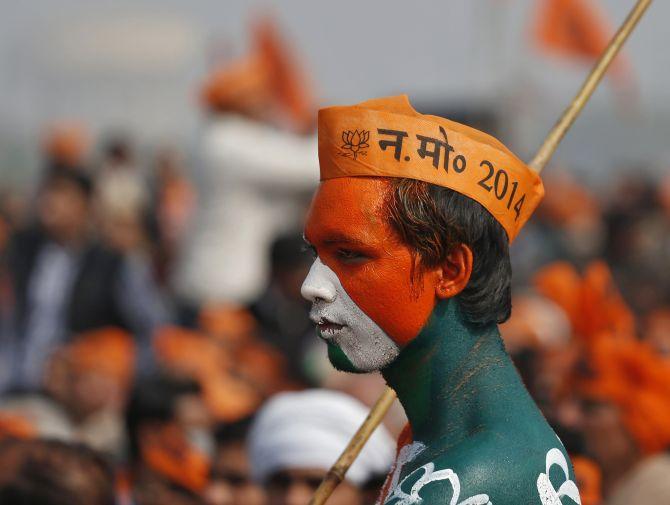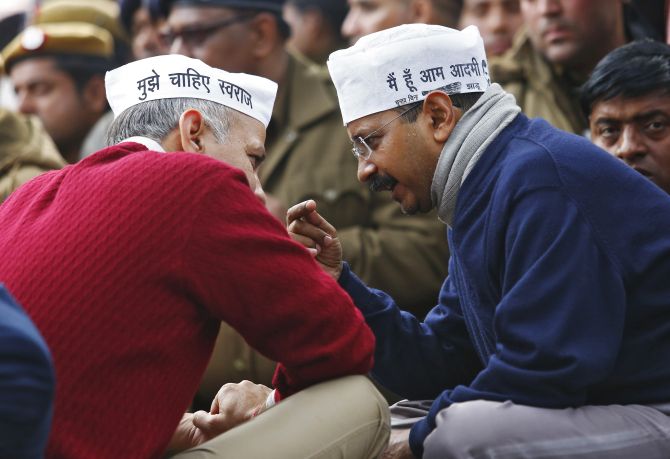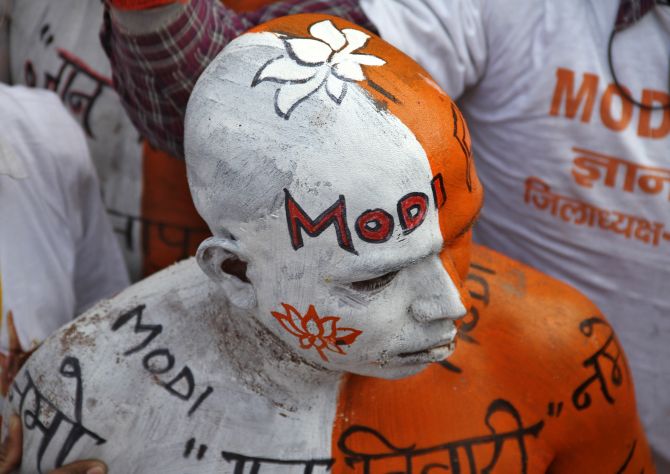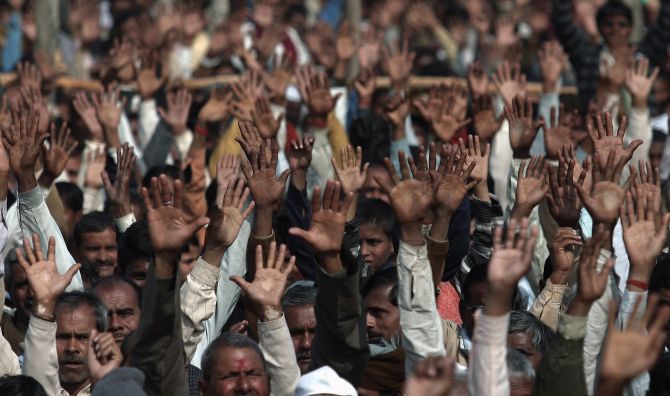Photographs: Ahmad Masood/Reuters Sheela Bhatt
'The Aam Aadmi Party will cut into our votes, but it won't affect our final tally in Uttar Pradesh,' a senior BJP strategist tells Rediff.com's Sheela Bhatt in this brilliant report on the coming electoral wars in UP.
With the Election Commission set to declare polling dates on Thursday, March 6, the attention is focused on Uttar Pradesh and Bihar where the Bharatiya Janata Party's prime ministerial candidate Narendra Modi's hopes lies.
His dream of becoming prime minister is built on the BJP's possible success in the 120 Lok Sabha seats of UP and Bihar.
"The Aam Aadmi Party will cut into our votes, but won't affect our final tally in Uttar Pradesh," a senior BJP leader, who is part of the group formulating the strategy to win the electoral battle of Uttar Pradesh, told Rediff.com from Lucknow.
The party strategist, who would not be identified by name for this special report, claims there is a Hindutva undercurrent in favour of the BJP and Modi in UP's 80 Lok Sabha seats. He adds this wave is spreading, cutting across class and castes.
But the bahubalis (political strongmen) and casteism, the BJP leader concedes, remains a difficult challenge before the BJP is pitted against the robust organisations of the Samajwadi Party and Bahujan Samaj Party.
As has been happening in the last few elections, he felt Muslims in UP would cast their votes in favour of the strongest anti-BJP candidates.
Please ...
For the BJP, the AAP raises a mix of anxiety and hope
Image: Arvind Kejriwal, leader of the Aam Aadmi Party, right, with AAP leader Manish Sisodia.Photographs: Anindito Mukherjee/Reuters Sheela Bhatt
One theory in the BJP is that the AAP may take away between 5 to 8 percent of the anti-United Progressive Alliance and anti-Samajwadi Party votes in the urban areas of Uttar Pradesh, which would otherwise have come to the BJP.
BJP leaders claim that this may not adversely impact the party's final tally because Muslims may give away their votes to "harnewala ummidwar (losing candidates)" this election.
According to the BJP's calculation, the leader claims, at the all India level, a strong AAP effect will give the BJP a tough time only in some 8 to 10 seats.
"The Congress is not in the picture in UP," the BJP leader says smugly.
He elaborated how the AAP's possible success may not be so bad for the BJP in UP. If the AAP creates enough buzz and Muslims take them seriously, eventually it will help the BJP.
Explaining further, he says, "It will divide the Muslim votes. That is what we aim for. The AAP will get the Muslim votes, but not enough to win seats. At most places, Muslim votes will be credited to AAP candidates who may not be the strongest candidate in the fray to win against the BJP."
In UP, for several elections, there is a simple calculation. If the Muslim voters in any particular constituency judge correctly who is the most likely to defeat the BJP candidate, then they vote overwhelmingly for that candidate.
This strategic voting has helped the Samajwadi Party and Bahujan Samaj Party win in different areas at different times because of clever projections of their candidates as the ones most likely to defeat the BJP candidates.
If AAP candidates get the backing of Muslim voters, they may still not win since they do not have any other powerful bloc backing them, like the Samajwadi Party has the Yadavs and the Bahujan Samaj Party has the Dalits. This theory creates anxiety and hope for the BJP. In that scenario, the BJP can hope to divide and rule.
Please ...
For the BJP, the AAP raises a mix of anxiety and hope
Image: A BJP supporter attends a rally in Lucknow.Photographs: Pawan Kumar/Reuters Sheela Bhatt
In the first week of March and less than eight weeks before voting, the BJP in Uttar Pradesh is talking about winning a minimum of 35 seats.
As the clamour for Modi is likely to increase, the BJP expects to win 45 to 50 seats. BJP leaders remind Rediff.com that Modi has not yet unveiled his final campaigning plan.
The BJP's claim of winning anything above 35 seats can be questioned because it is clear that there is an anti-UPA wave and not a pro-Modi wave as yet.
The impressive response to Modi's rallies is "60 per cent due to an anti-UPA and anti-Congress wave and 40 per cent due to pro-Modi feelings," a senior BJP leader conceded.
In spite of Modi's eight big rallies at the cost of many millions of rupees it is clear that in UP and elsewhere the anti-Congress and anti-UPA mood is setting the ground rules for the general election.
The BJP is well aware that only if the clamour for Modi's leadership rises will UP give the BJP more than 40 Lok Sabha seats. This is due to a quadrangular contest in most constituencies.
On Sunday, March 2, UP voters saw frenzied political activity when Modi, the AAP's Arvind Kejriwal and the Samajwadi Party's Mulayam Singh Yadav swore at each other at well-attended rallies.
Modi kept his focus clear. He went regional and didn't talk much about the Congress or the UPA government.
Kejriwal feels the media is not highlighting the issues he is raising, but he has no doubt that even in the villages of UP, 'the Mukesh Ambani-Modi nexus' issue is spreading like wildfire.
The AAP considers the issue of favours given and taken between Reliance Industries Chairman Mukesh Ambani, the Congress and BJP will pick up like the Bofors scam did in the general election of 1989.
Please ...
For the BJP, the AAP raises a mix of anxiety and hope
Image: Congress supporters at an election rally addressed by party Vice President Rahul Gandhi at Unnao in Uttar Pradesh.Photographs: Adnan Abidi/Reuters Sheela Bhatt
The BJP's Amit Shah, whom Modi has assigned UP, is engaged 24x7 in spreading his plans in every nook and corner of the state. He is camping in Lucknow, trying to fix booth-level committees, and is coordinating between Modi's new fan club and the party's veterans.
Unusually, Rashtriya Swayamsevak Sangh Sarsanchalak Mohan Bhagwat camped in Varanasi for a week last fortnight to energise RSS workers. Modi's possible candidature from Varanasi is being speculated mainly due to increased mobilisation of saffron cadres in and around Varanasi.
Modi and Shah both started their UP venture only after praying in the temples of Varanasi.
The AAP factor is proving complex and the BJP is yet declare seats for Modi and other senior leaders in UP. This shows the BJP's vulnerability in UP. Although the BJP is showing off its strength through well-orchestrated rallies, its worries are far from over.
At places where Modi addresses rallies, experts are engaged at salaries of up to Rs 100,000 to Rs 150,000 a month. These experts provide inputs and coordinate with different departments of the party machinery.
According to sources at the highest level in the BJP, as of today, Modi's biggest worry is to see how BJP cadres, leaders and active supporters react to the final list of Lok Sabha candidates for UP and Bihar.
Their acceptance or opposition to the candidates will change the chemistry between the cadres, voters and Modi's arithmetic behind the poll campaign.
Only if there is no large-scale rejection or dissatisfaction among the state-level cadres of Modi-Shah-Rajnath Singh backed candidates, things will work as per plan.
Another big worry is Modi's fan club has complained against BJP veterans who find them challengers for a new order in the party.
Modi single-handedly created this work force from Gandhinagar which consists of between 150,000 and 200,000 volunteers. It works in parallel with BJP cadres, provide inputs from Ground Zero to Modi's office by dialling a special number and by participating in online activities.
These online warriors are now offline in cities, towns and villages. On January 9, at the party headquarters on Ashoka Road in New Delhi, 60 young leaders met face to face with Modi and shared an intimate dialogue about the nation, election and ideas related to Modi's campaign. They are fanatically devoted to Modi and his vision for India.
The young Modi fan club have many complaints against the BJP's old guard on the issue of resources and value systems to fight the election. There is a communication gap between 'Team 272' created by Modi for the 543 Lok Sabha constituencies and the BJP's traditional network of workers.
Modi is trying his best to get the attention of UP's youngsters with the help of these non-traditional political workers who have joined Modi and not the BJP.
Uttar Pradesh will have the highest number of first-time voters in the 2014 election. More than 23 million young people will turn 18 in time for the election. They account for 17.6 per cent of the state's electorate of 129 million.
The battle of UP will be fought to get the votes of these young voters.
Before the young voter reaches the polling booth to cast his vote, his aspirations, his caste and his religious identity will be stoked by political parties.
Modi and the AAP's catchment areas clash in UP's youngistan.





article